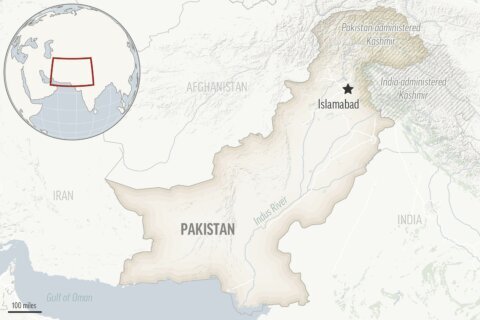As COVID-19 vaccines become more widely available, international economists say the world’s 20 largest economies are in a strong position this year to recover from the pandemic’s fallout.
In 2019, the United States and China, the world’s two largest economies, recorded $21 trillion and $14 trillion in gross domestic product, respectively, according to data from the International Monetary Fund. Yet with the exception of China and Switzerland, the remaining countries among the 20 largest economies experienced negative growth in their GDPs in 2020, as the coronavirus pandemic imposed lockdowns around the world.
The same data from the IMF, however, forecasts positive growth for all 20 countries in 2021, compared to the previous year. Spain is projected to have the highest GDP percentage growth in the group, at 16%. On the lower end, Turkey’s economy is projected to grow by 0.4%, while the U.S. and China are expected to grow by 5% and almost 11%, respectively.
The projections come as a report released on Monday sounds a warning by tying economic recovery to the global vaccination effort against COVID-19. The authors of the study — commissioned by the International Chamber of Commerce and published by the World Health Organization — say wealthy countries will take a significant hit to their economic recoveries unless they help developing countries speed up their vaccination efforts. The report is the starkest warning yet that by monopolizing the supply of COVID-19 vaccines, wealthy countries risk economic damage nearly as hard as developing nations, due to disruptions in global trade and supply chains.
Experts say that while a host of variables can impact the trajectory of wealthy countries’ economic upturns, vaccination efforts, mobility for consumers and products and access to digital infrastructure will be paramount.
Due to the scope of economic downturns in 2020, “The only place for some of these economies to go is up,” says Wells Fargo international economist Brendan McKenna. He estimates vaccine deployment will probably reach a widespread level by the third quarter of 2021, which in turn should drive “enhanced mobility, and people go out and consume goods and services… we should see that propel growth through the end of the year.”
But not all countries in the top 20 are equally positioned to roll out and distribute the coronavirus vaccines, McKenna says. He cited the populations of a group of 11 leading industrial nations as being more well prepared to receive the vaccine, and noted that some had already preordered the Pfizer vaccine.
[MORE: The Top 10 Global Risks for 2021]
“Now that we’re starting to see some of these vaccines get more approval, the U.S.’ growth prospects are probably the best in the world,” he says.
China was able to take strong measures to contain the spread of the coronavirus, McKenna notes. He points out that other nations, including India, Brazil and Russia, have weaker health care systems in place that could detract from getting their citizens vaccinated.
McKenna views the election of President Joe Biden and a Democratically controlled Congress as cause for measured optimism for more fiscal stimulus. “With a unified Democratic majority, there’s a better chance for more stimulus… The chance of additional fiscal stimulus in the U.S.” and other leading rich and developing countries could prompt more favorable forecasts, he says.
Bhaskar Chakravorti, dean of global business at The Fletcher School at Tufts University, agrees that vaccine rollout will be critical as the world’s leading economies launch their recoveries. But he also points out that countries’ ability to implement remote and digital technologies can be a strong indicator for how resilient their industries can be.
“There’s an intuition that if you’re technologically advanced, you have a greater ability to be resilient,” Chakravorti says. “That’s largely true for G-20 economies, and not true for many others.”
While both South Korea and the U.S. are digitally advanced, Chakravorti says “South Korea has very effectively used its digital capabilities to manage the pandemic, and is well positioned to manage vaccine rollout. That is going to help it recover and build its economy back up.”
Chakravorti also says digital acumen is essential as governments try to vaccinate their populations — leaders will likely rely on digital tools to track which individuals have been vaccinated, and make sure that only those who have received a vaccine return to work in their offices, or travel abroad.
In contrast, Chakravorti says the U.S. last year failed to implement its digital tools to formulate a coherent response to the pandemic: “The Trump administration completely fell flat on its face.”
And despite the U.S. having a robust overall network of digital infrastructure, Chakravorti says economic inequality in the country has translated into a digital divide that prevents some Americans from being able to access that infrastructure.
“[The U.S.] is the second most digitally developed country in the world, but children have to be driven to the parking lot of a Taco Bell in order to access the internet,” Chakravorti says. “The new acting FCC chairwoman has acknowledged that they’ve miscalculated the number of Americans without access to home broadband… This is a problem that is not equally spread across the country. If you’re Black, hispanic, or poor, the situation is far worse.”
Overall, “I do believe that we are going to have a recovery, and arguably a pretty robust one,” he says. But as the pandemic shut out small and medium-sized businesses around the U.S., Chakravorti notes that “A big chunk of our economy is that layer. And getting them back — the restaurant or bar around the corner — is going to take some time.”
More from U.S. News
U.S. Polarization, Instability From COVID-19 Recoveries Seen as Top Global Threats in 2021
The 10 Most Economically Stable Countries, Ranked by Perception
The 25 Best Countries in the World
Major Economies Eye Economic Recovery in 2021, Analysts Say originally appeared on usnews.com







